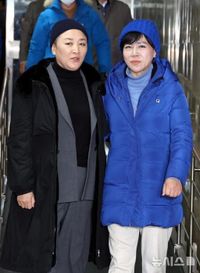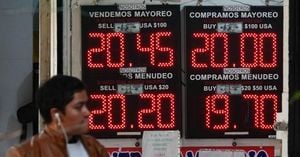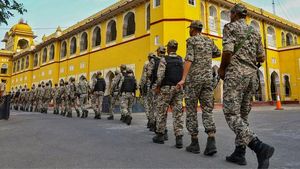On March 19, 2025, in a critical moment for South Korea's Democratic Party, influential members Jeon Hyun-hee and Jeon Jin-sook attended an emergency general meeting of lawmakers at the National Assembly in Yeouido, Seoul. This gathering underscores the party's response to urgent political issues that demand immediate attention.
The political atmosphere surrounding the Democratic Party is charged with challenges that have captured public discourse. The timing of this emergency meeting highlights the need for decisive action and unity within the party as they navigate these turbulent waters. The presence of prominent figures like Jeon Hyun-hee, a member of the party's Supreme Council, and Assemblyman Jeon Jin-sook signifies the gravity of the situation faced by the party.
Political analysts have noted that such meetings are not merely procedural; they are strategic gatherings aimed at solidifying party direction and resolving internal conflicts. With elections on the horizon and public sentiment shifting, the discussions held in this assembly room are set to play a pivotal role in shaping the Democratic Party's roadmap in the upcoming months.
Furthermore, these types of emergency meetings often serve to strategize responses to pressing issues that may affect the party's credibility and voter support. Such gatherings allow party members to articulate their positions, forge consensus, and tackle criticisms that have arisen from within and outside the party. As Jeon Hyun-hee and Jeon Jin-sook convened with other lawmakers, their discussions likely revolved around tactical approaches to addressing various public concerns.
The urgent need for dialogue at this meeting may reflect the broader political environment in South Korea, where discontent over economic and social policies has been prevalent. As public trust ebbs away, the Democratic Party's efforts to align themselves closely with pressing voter issues will be crucial in regaining political traction.
This meeting is particularly notable in light of recent challenges faced by the party, including internal divisions and opposition pressures. In this context, it becomes evident that Jeon Hyun-hee and Jeon Jin-sook's participation symbolizes their commitment to regroup and fortify the party's stance in the face of adversity.
As the Democratic Party contemplates its future, the impact of this emergency meeting could extend beyond mere logistics. It may signal a renewed strategy focused on fostering unity, transparency, and accountability—a critical need in maintaining political relevance and voter support.
In conclusion, the attendance of Jeon Hyun-hee and Jeon Jin-sook at the emergency meeting epitomizes a turning point for the Democratic Party in South Korea. Their engagement in tackling immediate political challenges emphasizes the party's commitment to evolve and adapt in a rapidly changing political landscape.




